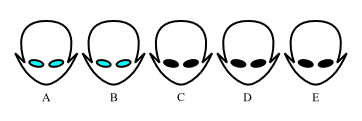The theology of Sausage Party
It is enough to look at the ~2minutes of the trailer for Sausage Party to realize it is one crass, raunchy, silly comedy. For all its juvenile humor, it also gets enough critics puzzled enough that the rottentomatoes critical consensus is about its good gag-to-laugh ratio and thought provoking story-line. And there's something to that, I think. So buckle up, we're going to use a stoner comedy to explore theology.
--:--
Let's first summarize the plot. Spoiler alert, obviously, though the trailer reveals the basic premise anyway: food items are conscious. They wait on the shelves of the supermarket to be picked up by the gods, and carried to some better place where "nothing bad ever happens to food", as their song goes.
Well, something bad does happen to food once it reaches the home of the gods obviously. Those "gods", well, us, they eat the food. And they slice it, dice it, boil it -- even the children -- and do all sorts of unpleasant things to it. One of the film's characters, a stubby sausage, sees this first hand and manages to run away and warn the others. The other characters make a similar discovery in the supermarket itself. It turns out that the whole song about the good place the gods take the food to was an invention of "the unperishables" (hard liquors and a twinkie) to pacify and give the other food items a happy life in the supermarket before they either get thrown out for being expired, or picked and eaten.
With the gumption and pluck of film protagonists however, our characters mount a rebellion. They are able to successfully defeat a wave of customers to the supermarket, take control of the store, and then proceed to celebrate orgiastically. Rules about what food goes with what are discarded, as those were imposed by the now defeated gods.
Finally, after the orgy one of the characters makes a discovery: they are all characters in an animated film. Therefore, they enter a portal to confront the actors about what exactly they had in mind with all this.
So that's about that, when it comes to the plot. Now then, let's talk natural law.
--:-:--
Actually no, let's first talk about Gnosticism.
 |
| Bless me father for I have sinned. |
The first century AD -- and some time after, too -- was a very fertile period in terms of systems of spirituality. Doing justice to that multitude of currents in a blog post by someone only scantily informed such as myself is impossible. For the purpose of this post, I can only paint with the broadest of strokes. Here goes.
Gnosticism is a lump term for a whole set of religious ideas that sprung up around early Christianity. The mythology is eclectic, developed by many people in slightly different ways, but there is a common element. There exists a Creator, yes. However, he is at best stupid, at worst actively malevolent.
There is some limit to this creator's domain. Actual, early Christian-heresy Gnosticism limits him to creating the physical. So it is only with some abuse of the term that I can expand this creator's domain to everything -- however, I hope to convince you, that on the one hand Gnosticism survives well enough into the present day as an intuitive framework if not an explicitly codified system of spirituality, and on the other hand that my expansion is not that much of an abuse after all.
The second point is easy, actually. Post-Enlightenment, it is harder to believe in any other dimension to the universe than the material. If all the best philosophers are telling us the material is all there is, then the Gnostic creator really has domain over everything.
The first point is not much more difficult. I think many people would either find any notion of God implausible or, if the existence of a creator were conceded, then it would have to be exactly the kind of stupid or evil creator of the Gnostics.
I mean, just what demiurge would a respectable modern man, woman, or genderfluid helicopter, be able to believe in and not be lame? Evolution is one. Or maybe something like Lovecraft's gods could be believed in, ironically of course. And wouldn't you know it, Eliezer Yudkowski, of Rationalist fame, has poetically named evolution Azathoth, after Lovecraft's blind, idiot god.
Now for real, let's talk about natural law.
--:-:-:--
Fair warning: I'm even less qualified to discuss this, as my knowledge of Thomas Acquinas is through osmosis. Feel free to correct me in the comments.
But, as far as I know, here's the idea -- and this is about the theological concept of natural law, not the scientific one. The idea is simple enough: things have an essence, a nature, something about them that makes them what they are. A tree is a tree because that is its nature. A man is a man because that is its nature. And so on.
The nature of a thing imposes constraints on it -- that's what it means to be X and not Y -- and therefore also constrains how to deal with that thing fairly. You cannot hold a tree to a promise; but a man should keep his word.
The constraints imposed by nature are not just about what something can do but also, in the case of sentient beings, on how their minds work. People have natural fears and needs. In fact, the currents animating a mind are often contradictory within itself, to say nothing of contradicting between different minds. Therefore, a social law, to be just, must seek a balance, even the best balance, possible under the constraints of nature. An example would be, I guess, how one could argue for monogamy. Yes, it may be in a man's nature to covet as much sex with as many partners as he can, but it is also in the nature of men and women to be jealous, or afraid of being abandoned, or fearful of investing in children not their own.
The concept of natural law is still used in modern law, and in a secular way. This is how something like the International Bill of Human Rights is justified. However, the main kind of thinking behind the development of natural law was philosophical, spiritual, religious. There is therefore another component to the nature of something: its purpose. A good law made by men must therefore respect nature not just in balancing fears and needs, but in easing the fulfilment of a person's purpose.
And I need to be clear here: this purpose predates the person. This is not a goal someone chooses for themselves. This is the goal given to a man because he is a man, by the Thing that made men in the first place.
Sure, good laws should allow people to pursue their happiness to some extent because they themselves have chosen what would make them happy, but even more so, good laws should foster virtue because it is good for people to be virtuous.
There is however a fly in the ointment here.
--:-:-:-:--
Who gives the nature of a person? They weren't there to choose, by definition. Their parents didn't have a choice either. Biology does what it does and hopefully a functioning baby comes out. Far more likely that a human mother would birth a stillborn human than a live crocodile. There can be only one answer: god, lowercased to metaphorically include either evolution or Azathoth or anything else that one would place into the role of first cause or creator.
But if, say, this god is evil, or stupid, or an uncaring unpurposeful physical process, why should the nature that god bestowed upon something be respected and used as the basis for the laws that thing must then respect?
The food items of Sausage Party know that there are laws. Some foods only go with others, and only at the right times, because the gods said so and that makes it right. The gods made the food, and they love the food, and therefore what they said is good and right.
Well, the gods did love the food, but it turns out, not in a good way. If the gods are evil monsters, then there is no basis for their laws to command respect. And hence, after their victory over their gods, the food items celebrate by defying every rule they had before respected. Free from the gods, they could decide for themselves what they wanted to be. If something's nature is created by evil, not love, there is no reason to love that nature, and all the reason to change it.
--:-:-:-:-:--
Although I'm more than sympathetic to the theological approach to natural law, I will acknowledge there are secular ways to at least try and make natural law, as invoked by, say, the International Bill of Human Rights, work. Your nature must be respected because your nature is there is a pretty good argument, most of the time. It will become less convincing as human nature itself becomes accessible to change -- or at least, appears accessible to change. But perhaps that is a discussion for another time.
Let's just stick to Sausage Party for now. As we've seen, it is a textbook exploration of what a Gnostic outlook entails. And I think that exploration reveals that the Gnostic vision just, well, doesn't fit our monkey brains.
Having defiled every precept the monster gods gave them, post-orgy the food items lie around the supermarket, still feeling in their flesh echoes of their previous activities but, for the most part, spent and sore. Now what?
I wonder why the film's creators didn't just end the film with the orgy actually. They could have pulled that maneuver, but instead they went with the not implausible sounding idea that you can get bored of partying. Or, more generally, you can get bored of doing what you want.
It seems our natures (hah) and by extension those of human-like characters in fiction is to seek answers for "what it's all about", and unfortunately self-constructed answers won't cut it. At a deep level we understand such answers are too facile, and too mutable. If it's just us making the rules, we can always make new ones; what's the point?
Of course, in the world of Sausage Party, there can be no final answers. When the food items step through the portal to our world, they don't do so to find the answers to life, the universe, and everything. It is to scold the actors who invented them for their twisted imaginations and for various other misdemeanors (such as why a "Jewish" food item was not played by a Jew). A truly gnostic story can never end. A man for all seasons can die a Christian saint, but a gnostic must always topple another god.


Comments
Post a Comment